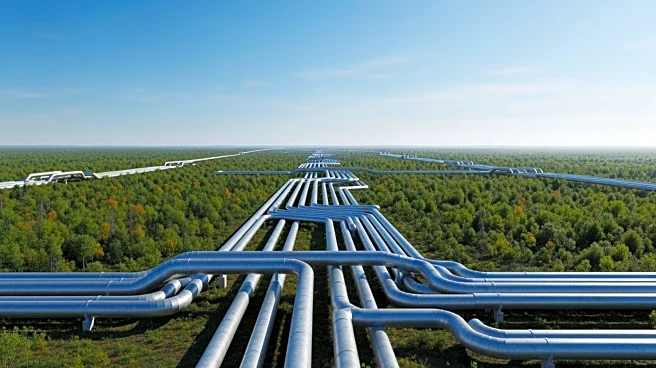What's Happening?
The Trans Mountain Expansion project, which came online on May 1, 2024, has significantly enhanced Canada's capacity to export crude oil, positioning the country as a major competitor in global markets.
Previously, Canada's oil and gas sector faced pipeline shortages that limited export capacity and forced producers to sell at discounted rates due to maxed-out storage. The new pipeline allows oil producers in Alberta to send three times more crude oil to the Canadian Pacific coast, increasing market access by nearly 600,000 barrels per day. This development has revitalized the sector, which was previously losing an estimated $20.62 billion annually due to transport capacity issues.
Why It's Important?
The opening of the Trans Mountain Expansion pipeline marks a pivotal shift in global energy geopolitics. It enables Canada to directly ship crude from Vancouver to Asian ports, enhancing trade routes and economic ties with Asia. The Baltic Exchange has introduced new benchmarks to track Canadian crude exports to Asia, reflecting the significance of this new trade route. This development occurs amid ongoing geopolitical tensions, including a trade war between China and the United States, which impacts global energy markets. The pipeline's success underscores Canada's growing influence in the energy sector and its ability to adapt to changing global dynamics.
What's Next?
The introduction of new benchmarks by the Baltic Exchange suggests continued monitoring and adaptation to evolving trade flows. As Canada strengthens its position in the global energy market, stakeholders will likely focus on optimizing trade routes and expanding market access. The geopolitical landscape, including tariff disputes and energy security priorities, will continue to influence trade dynamics. The pipeline's success may prompt further infrastructure investments to support Canada's energy export capabilities.
Beyond the Headlines
The Trans Mountain Expansion pipeline highlights the complex interplay between energy infrastructure and global politics. It underscores the importance of reliable transport routes in maintaining competitive market positions. The pipeline's impact on Canadian producers and global trade flows may lead to long-term shifts in energy security strategies and international alliances. As countries navigate trade wars and shifting alliances, infrastructure projects like this become critical in shaping future energy landscapes.










